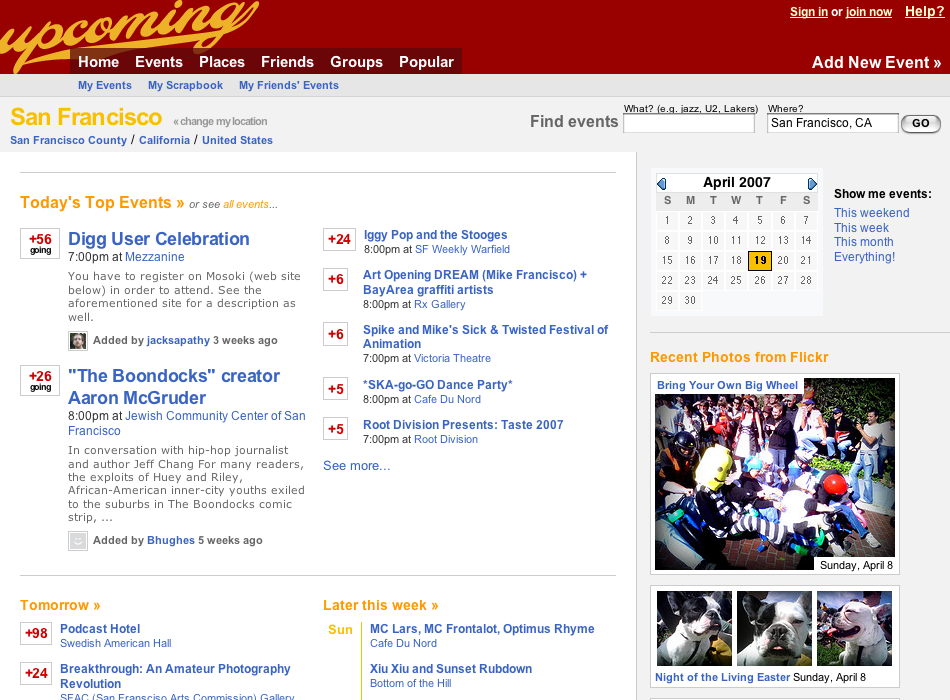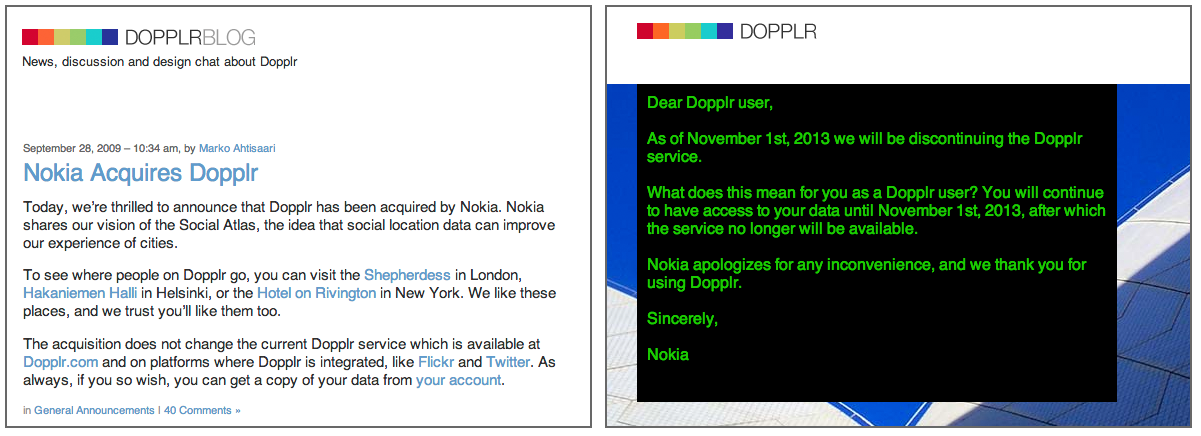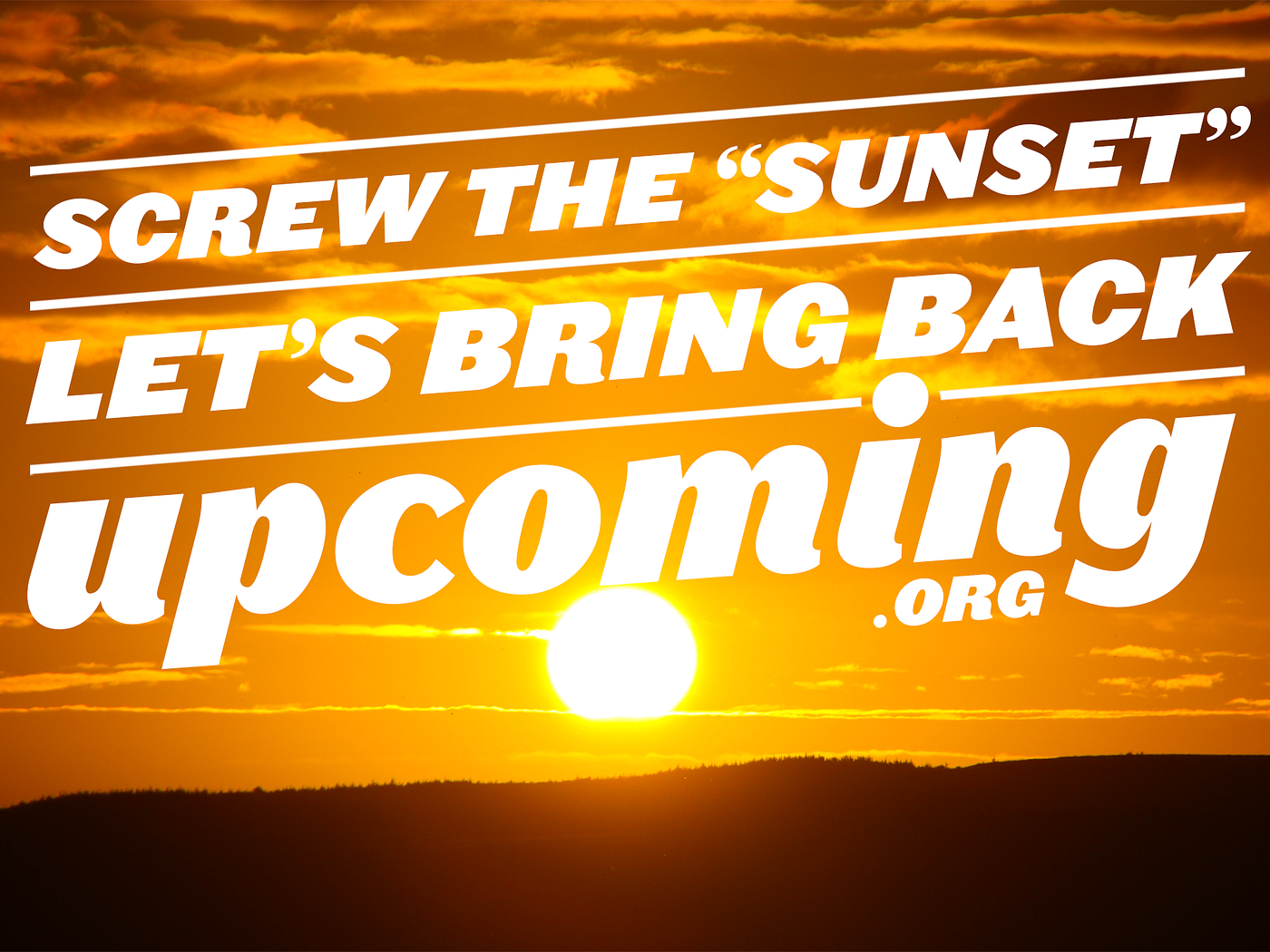Diary of a Corporate Sellout
You haven’t made it until someone calls you a sellout.
My moment was October 5, 2005, the morning after we announced that Yahoo! acquired my side project, a collaborative events community called Upcoming.org.
“Pffft. Sellout.” — Billistic, 9:06am
Starting Up
I launched Upcoming two years earlier in 2003, after five months of working in my spare time while managing the website for an investment firm in Los Angeles.
Upcoming was a community for discovering interesting events in a city and tracking what you and your friends wanted to do. Entirely curated by its members, every event was added by someone in the community, surfacing events that were often under the radar of local weeklies and newspaper listings.
It launched on Talk Like A Pirate Day, September 19, 2003, and I celebrated with a handful of friends at a nearby bar, passing out eye patches between rounds of beer.

Upcoming was among the first websites to use a social network for more than just meeting people. Friendster, and Six Degrees before it, let you connect to friends but limited the interaction to just browsing your friends’ friends and writing testimonials.
According to the New York Times, Jonathan Abrams built Friendster for surfing photos of cute girls, and it showed. It was probably great if you were single and trying to hook up. I’m married, so Friendster was kind of boring.
My hope was that I could use a social network to solve other first-world problems.
Upcoming was hardly alone in this line of thinking. The zeitgeist was in the air, the early days of what Tim O’Reilly would soon dub Web 2.0. Upcoming launched a month after Myspace and the same week as Del.ici.ous, and predated Facebook and Flickr by five months. Many more followed.
Each of these sites used the social graph to solve their respective problems— finding interesting links, photos, restaurants, bands, whatever. They used the network to connect people together in new ways.
It worked really, really well.
Upcoming wasn’t a blockbuster, by any means, but it found a cult audience of early adopters that were both geeky and social — the intersection of people who liked spending time on computers in 2003, but also spending time around other people.

A year after launching Upcoming, my son was born. What little spare time I had outside of my day job vanished even as Upcoming continued to grow.
I asked two close friends, Gordon Luk and Leonard Lin, to join as co-founders and help launch a redesign with a bunch of new features and other recent innovations, including private events, tagging, mobile integration, and an open API for developers.
The week we launched the redesign, in March 2005, Yahoo! bought Flickr and everything changed.
Selling Out
Even with two new co-founders, Upcoming.org was still firmly a side project. We never incorporated or took any investment, and none of us worked on it full-time. It made enough money in Google ads to cover the hosting bills and bubble tea.
Despite that, Upcoming continued to grow in popularity. The API led to a flood of new mashups and integrations, built into every major blogging platform of the day and powering the calendars of major sites.
Upcoming’s cultural footprint was larger than its traffic numbers would suggest, since it was heavily used by the geeks creating the next wave of social startups.
Among them were Stewart Butterfield and Caterina Fake, co-founders of Flickr and old friends from the proto-blogging scene.
After the Flickr acquisition, Caterina was tasked with bringing other interesting people and projects to Yahoo. She did it well. Throughout 2005, Yahoo hired many of the most creative people I’ve ever met. Yahoo was actually cool, in its own goofy way.
That July, Caterina emailed me to see if we’d ever be interested in joining Yahoo. Two meetings later, it was a done deal. We sold Upcoming and moved to Sunnyvale.
I kept my day job at the financial company until the day it was acquired. My resignation meeting with my boss was surreal:
“So… Yahoo bought my website.”
“I don’t think I can counteroffer that.”
For me, it felt like a dream. It was a tiny acquisition by any standard, but the money was secondary to the fact that I’d finally be able to work on my own project full-time. We’d be working next to some of our favorite people in the world at one of the most prestigious Internet companies, and Upcoming would get the resources it needed to grow and thrive.
In the back of my mind, there was a gnawing worry. I knew that once the deal was signed, Upcoming wouldn’t be my baby anymore. But it felt right. I crossed my fingers, we signed on the line, and hoped for the best.
Dropping Out
At the time we were negotiating, the only online communities I knew that had been acquired were Google’s purchases of Blogger and Dodgeball, LiveJournal’s sale to SixApart, and Flickr’s sale to Yahoo. Del.icio.us joined six weeks after us.
Each one posted a gushing blog post about how they were thrilled to announce their acquisition. Here’s mine.
Each acquisition seemed to be a success, with the teams apparently retaining autonomy and thriving under new ownership.
You know how this story ends. You know because you’ve experienced it yourself, usually two or three years after something you love was bought by a big company. The founders leave because of a culture clash, the site falls into disuse or changes focus under new management, and eventually you see a notice along these lines:
“Thank you for being a part of our incredible journey and thanks for all the support. P.S. Your data will be deleted in two weeks.”

These breathtaking acquisition announcements and their matching closure notices are so common that they’ve become a cliché. There’s even a Tumblr dedicated to them.
Our story was similar. To Yahoo’s credit, they mostly left our tiny three-person project alone. Culturally, it never made sense.
We spent a lot of time on integrations with the rest of the Yahoo network, integrating it into everything from Pets and Autos to Local, Maps, Mail, and Search itself. But Upcoming’s small, geeky base often clashed with the core Yahoo demographic.
(Imagine searching the Yahoo homepage for “san francisco events” and getting results for an MC Frontalot show, a microformats meetup, and a pillow fight flashmob and you can begin to see the problem.)
We launched a major redesign, migrated to Yahoo IDs and a Yahoo subdomain, and the site continued to grow quickly.
When we posted our acquisition announcement, we wrote up a little FAQ to put on Upcoming.org itself. It includes this deeply ironic, naïve gem:
You guys are big corporate sellouts!
That’s not really a question.Fine… You guys are big corporate sellouts?
If getting paid for doing what you love is selling out, guilty as charged. But know that nothing has changed our ideals, and we won’t compromise ourselves because we’re working at a large company. We’ve always been focused on making something useful and used, and we think that working with Yahoo! will make that a zillion times easier.
All of that was true. We didn’t compromise our ideals, we focused on making something useful, and we certainly thought working with Yahoo would be beneficial to everyone.
What we didn’t anticipate was how giving up ownership sells the community instead.
Building an online community is like throwing a big party. You build the house, decorate it, and send out some invites. But it’s the people that show up that make it special.
When you sell the house, you’re not just selling a house. You’re selling everyone inside.
We now know that online communities have a very difficult time surviving that transition. For years, YouTube was the rare exception, but even they’ve had trouble in the last couple years as Google tried to cram Plus down everyone’s collective throats.
While it was great to work on something I’d created full time, I knew within the first couple months that working in a company as large as Yahoo wasn’t for me. It was no longer something we owned. We were taking care of someone else’s baby.
The site was healthy and growing, and we were all ready to try something new. I left Yahoo at the end of 2007 and my two cofounders followed shortly after.
After we left, the site fell into disrepair. Spam, always a problem, was left unchecked. Social features were downplayed or removed entirely. Updates trickled to a crawl and then stopped entirely.
In 2010, a leaked slide from an internal Yahoo meeting revealed a couple dozen products on the chopping block—including Del.icio.us, Fire Eagle, and Upcoming.
It took three more years before they pulled the plug, and Upcoming finally closed last April.

Starting Over
Yesterday, danah explained how “selling out” has lost its meaning.
For the most part, she’s right. Certainly among teens, the moral panic of over-commercialism coming from young die-hard fans is over.
As much as older generations may wince at YouTube celebrities pushing Taco Bell or Lorde pimping Samsung phones, nobody really cares anymore.
If anything, it’s a mark of success. You’ve built an audience that companies want to reach. You’ve made something people love, and they want those positive feelings to rub off on their products.
These brands provide independence and financial freedom in a way that publishers never could—without sacrificing ownership or creative control. Artists still make the music they want to make. Kids on YouTube are making a living making videos. The audience doesn’t care and everyone’s integrity remains intact.
Online communities are a different story.
If you start a social startup and give up ownership, whether through significant investment or an acquisition, you’re putting a community at risk.
It’s not just “data.” It’s the collective effort and history of everyone that breathed life into the thing you made.
There’s a huge amount of trust there, and we have every right to be angry when the services we use disappear. They tie to our identity, they forge new friendships, and they hold our collective history.
In the case of Upcoming, it was a decade of memories and experiences from real people. It was my responsibility not to fuck it up. People trusted me with those memories, and now they’re gone.
It’s the only time in my life that I felt like a sellout. It’s not a great feeling.
Through my work with Kickstarter and organizing XOXO, a festival entirely about independence, I’ve surrounded myself with people who make their living without sacrificing creative or financial control of their work.
When invited, I travel around the world to talk to people about why independence matters. I’ve always talked about my mistakes in public with the hope that others learn from them. Some of these lessons came at a high personal cost, but I’ve gone to great lengths to make sure I can talk about them.
I’ve never had the opportunity to fix one of them.
Last month, through a bizarre and surprising set of circumstances, Yahoo sold me back the Upcoming.org domain.
As far as I know, this is a first. Major corporations don’t give back the original domains they acquired back to their founders, and Yahoo should be commended for it. It’d be nice to see this right-of-first-refusal become part of standard shutdown procedures.
Ever since I left Upcoming, I kept waiting for someone to build something that scratched that itch, but it never happened.
I had no idea if anyone else felt the same way, so earlier this month, I launched a Kickstarter project to fund rebuilding Upcoming and restoring the historical events.
It hit the goal in two hours. More than 1,500 people have pledged over $100,000 to bring Upcoming back.
It’s hard to articulate what that means to me.
To me, it represents a chance to make things right.
I miss Upcoming.
I miss the community that made it great.
And I won’t sell out again.

Every Lonely Sandwich Video At The Same Time
Adam Lisagor’s pioneered a style of promotional video that’s changed how startups market themselves. They exude a nerdy cool, clearly showing the product or service, explaining why it matters and why you should use it with a deadpan sense of humor.
I never feel like they’re selling to me, and Adam seems to only make videos for stuff he loves, turning Sandwich Video into a stamp of approval for great new things.
For me, the best Sandwich Videos are the ones with Adam himself. They always make me want to give him a hug, and then hand him all my money.
As a tribute, here’s every single video featuring Lonely Sandwich as pitchman in chronological order. At the same time.
The Return of Upcoming.org
I don’t even know where to start, so I’ll just start with the news:
- In a surprising move, Yahoo sold the Upcoming.org domain back to me.
- I want to build a new Upcoming.
- I launched a Kickstarter project to make it happen.
I wrote much, much more on the project.
Yes, this is insane. More thoughts soon.

